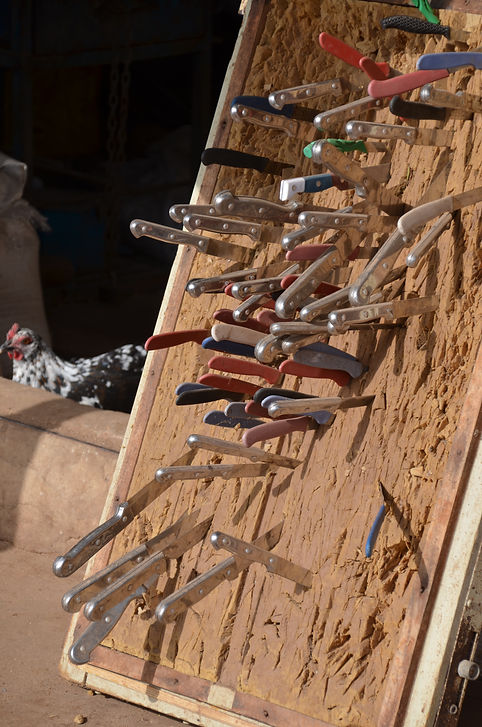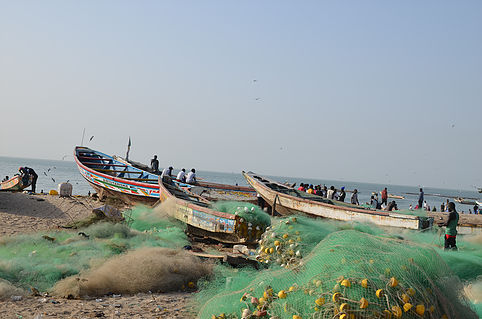For years, I had a dream: to welcome the New Year not wrapped in wool and sipping mulled wine, but barefoot in a bikini under the palm trees. There was just one catch—I’m a Christmas-at-home kind of woman. So, that left exactly eight days to jet off somewhere warm during my daughter’s winter break. The rule? It had to be sunny, not too touristy, and no more than six hours away by plane.
Enter: The Gambia.
Now, I’ll be honest. My knowledge of The Gambia was pretty limited before booking. I knew its dot on the map, that it’s an Islamic country, and… that was about it. But with a few frantic Googles and a dusty travel guide, I declared myself sufficiently informed and ready for our African adventure.
Six hours after takeoff from Amsterdam, we landed in Banjul, The Gambia’s small-sized capital (surprisingly not its biggest city). We flew over the Sahara Desert, which, viewed from the air, is a wild, mesmerizing sea of dunes: fiery red, then golden, then pale like powdered cinnamon. It was surreal. One moment you’re sipping coffee in your living room wrapped in a blanket, the next you’re having dinner on a tropical terrace in thirty-degree heat. The magic of modern life never fails to floor me. We wake up in Europe, we go to sleep in Africa. How insane is that?

Visas, Vibes, and Vintage Resorts
Despite Romanian websites warning that Gambian visas could only be obtained in Paris, a little investigative digging revealed otherwise. Pro tip: You can absolutely get your visa right at the Banjul airport, for a small fee and a smile.
Our home base was Palma Rima, a resort in Kololi with the faded charm of Ceaușescu-era holiday camps, complete with “once-white” towels and limewashed bungalows. Officially rated four stars, realistically a generous three—but who cares? The pool was massive (allegedly the biggest in The Gambia), the sun was shining, and we weren’t there for the thread count.
Day one: strolls along the Atlantic, a dip in the pool, and plotting our coming escapades—we hadn’t come this far just to lounge by the chlorine. Termites, Traffic, and Toubabs
Termites, Traffic, and Toubabs
Day two was packed. The plan: visit several villages near the Senegalese border, cruise down the Allahein River in a wooden pirogue (basically a traditional log canoe – an authentic pirogue boat is hollowed out of the trunk of one single tree), and explore both the beach at Kartong and the bustling fishing village of Tanji.
Breakfast? On the roadside. Menu: white bread, butter, jam, and an unexpected side of termite mound contemplation. I stared at the 2-meter-high earth tower and thought: How in the holy molly termite do these tiny things pull this off? That’s real teamwork, boy! Turns out, termite societies are masterclasses in organization—workers, soldiers, kings, queens. A real insect monarchy. Fun fact: a termite queen can lay up to 40,000 eggs a day. That’s right. Who runs the world? Queens.

Then, off to Serekunda (it means “the house of Sayer’s family – Sayer kunda”, Sayerr Jobe – the founder of this city in the ninth century) the country’s biggest city, where chaos is a lifestyle: streets overflowing with vendors, colors exploding from every corner, women balancing baskets and babies, food sizzling on makeshift grills, and music everywhere. It’s noisy, gritty, alive. “Sensory overload” doesn’t even begin to cover it.


Learning and Laughing with Little Locals
We stopped at a local school—technically on holiday, but the teacher kindly summoned the kids for our visit. The building was in rough shape, but the kids? Pure sunshine. If you’re blonde, prepare to be the Beyoncé of the village. They shouted “Toubab!” (foreigner), held our hands, peeked into our bags for sweets and pencils, and grinned with all the joy in the world. Meanwhile, I couldn’t help but think of the irony—kids back home overwhelmed with toys, while here, one candy is gold. The current education system is based on the one established by the British during imperialism. The Gambia has had a university center only since 1999. The literacy rate for women is only 47%. 








The Butcher, the Baobab & the Barracuda
Next: the animal market (mostly cows and goats). If you’ve never seen slabs of meat hanging on rusty hooks (probably to flavor the meat) in the 35°C sun while eagles circle overhead and flies buzz peacefully… count yourself lucky. I honestly reconsidered meat altogether. Vegetarianism has never looked so appealing.









Relieved to leave the meat symphony behind, we glided down the Allahein River in a wooden pirogue, crossing toward the Senegalese border. I lost count of how many baobab trees I photographed—they’ve been my obsession since childhood. These majestic giants, over 7 meters high, live over a thousand years and produce fruit that locals turn into a sweet drink. Everything here is sweet. Too sweet, actually.
At Kartong Beach, we had lunch Gambian-style: rice, couscous, spicy fish meatballs, domoda (peanut butter sauce), yassa (onion chicken), and grilled catfish. Delicious, every time, everywhere. After lunch? A lazy swim in the Atlantic, followed by tanning, or, for non-swimmers like me, just melting in peace.






Tanji: Where the Fish and the Flies Dance
Our final stop: Tanji, the iconic fishing village. If you think you know the smell of fish, think again. Tanji is a sunbaked, semi-fermented ocean bounty, laid out near the actual trash heap. But what a scene! Boats unloading, people waist-deep in water carrying bowls of fish on their heads, bartering chaos, shouting, children, music, crashing waves. A full-on fish opera. I’ll never forget the sights—nor the smells.
People were bargaining (you have to bargain for anything you buy in The Gambia, it’s kind of a national sport) for catfish, barracuda, turbot …
We have visited the place where the most consumed fish in The Gambia, the bonga fish, is smoked. Beautifully arranged with their tails up, the fish were kept smoking for several days. Well, if you see that the dump is next to the place where the fish is smoked, let’s just say… your appetite might take a brief vacation.








At the end of this whirlwind day, I tipped our fantastic guide and driver 200 dalasi each (about 4 euros, or 10% of the average monthly salary in The Gambia). Worth every cent.
Wherever you go here, people smile, ask your name, call you “boss lady,” and truly want to connect. It’s disarming, warm, human.
But more on that in the second part.


